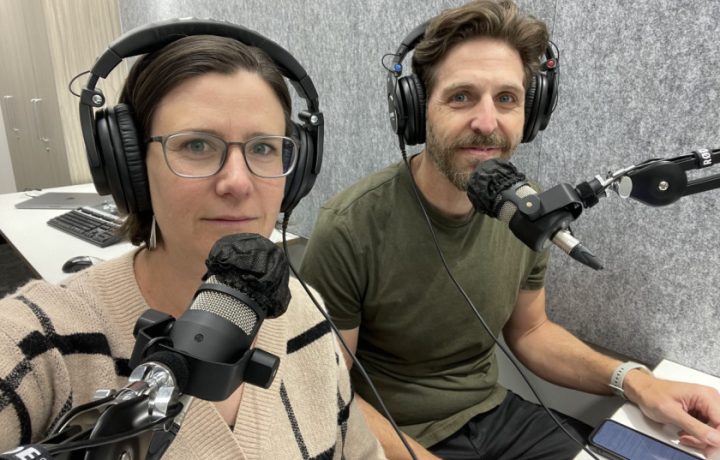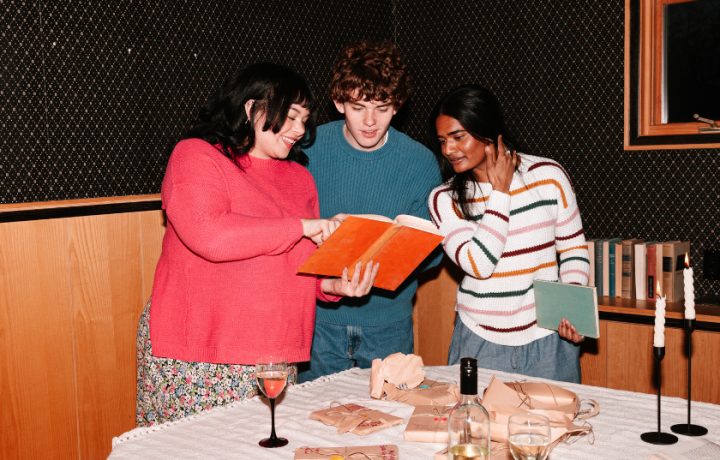From pornography to death rituals: Meet Canberra’s Twoboo podcast

Posted on
20 years ago, students Melanie Skinner and Sean Costello aired on the University of Canberra’s CueFM radio station with a series of conversations that challenged the status quo, pushed boundaries, and sparked trailblazing conversations. Nothing was taboo, in fact, that was the whole idea.
As masters of discussion and radical thought provokers, they, alongside experts in the field, investigated issues that were considered the most controversial in our society at that time.
Now, 20 years later, Melanie and Sean and the same team of experts are revisiting these polarising topics through Twoboo, a podcast that reflects on the changing landscape of our society, the conversations that continue to remain silent, and those who have now found their voice.
We sat down with Melanie and Sean to discuss their comeback and as you can imagine, nothing was off-limits.
Can you tell me a little bit about yourselves and how you got started in radio 20 years ago?
We were both communication students at the University of Canberra, interested in current affairs issues that were relevant to students on campus at the time, but not generally raised on mainstream media.
The University Union provided a great little radio station called CueFM, which was broadcast on campus and to university residences. Every Monday night for two hours we spoke with friends and experts. We won a few awards for the show but since university, have largely done other things.
Why were you both drawn toward (and still are drawn toward) taboo topics?
We talk a little bit about that in our introductory episode. We feel that as long you are respectful of others’ opinions and beliefs, then it is usually better to discuss complex or taboo topics, rather than sweep them under the carpet. We didn’t use a ‘for and against’ style approach that was prominent at the time, but instead dived deeply into some of these issues with experts.
Potentially having conversations about complex issues has become more difficult. Now online arguments are waged in 255 characters, and we tend to spend our time either accessing media that conforms to our world view, or getting angry about content we are fed that runs strongly counter to that view. In our new podcast, we try to tackle topics like pornography, sexual assault and difficult decisions around death from the most informed position we can in a 45 to 60 minute interview. We’re conscious that we’re amateurs in all things—journalism and the topics themselves—so we’re just trying to be as honest and informative as we can.
The topics may be provocative, but we’re not trying to be. If anything, we’re trying to de-escalate some of the emotion around them
The Twoboo podcast is revisiting these topics with the same experts you talked with 20 years ago. How did this idea come about?
So much has changed since those first interviews were aired. The #MeToo movement, royal commissions into many of the issues we spoke about, introduction of voluntary assisted dying laws across the country, the incredible prevalence of pornography online.
We thought it would be fun to dig out those old recordings and reflect on those changes with the original people we spoke to. Have their views changed? Have we changed? And what happened to those issues we were speaking about?
Of course, not all of our experts are still working in the same roles now. Some have reflected on how their personal views may have changed, while others brought a greater perspective on the issues having worked in this space for 20 years.
Listening back, it was interesting to hear how forward-thinking some of the people we spoke to were about where the community might be going. But it was also fascinating to speak with them again about how much their views had changed because of the experiences they have had in the intervening period.
We’ve also changed as people. We have teenage children of our own and the challenges are going through are different to what we faced at a similar age.
Are there any topics you can’t believe you were talking about as ‘taboo’ 20 years ago?
It’s been a great experience and our ‘experts’ have been wonderfully generous with their time again. So far, we haven’t encountered a topic that we couldn’t talk about, although we’re probably more conscious now than we were 20 years ago about making sure we’re being respectful of all potential attitudes to these issues.
Having said that, we had some wonderful friends come in a speak to us about their personal experiences of flatulence and burping back in 1999. If anyone considers themselves an expert in that area and would like to share developments over the last 20 years with us, we’d love to hear from them.
In your humble opinion, what actually makes a topic taboo? And do you look at them as being a bad thing?
One of the things we’ve probably reflected on, both when we did the show originally, and now, is our own personal prejudices. We’ve inevitably picked these topics because we—two privileged white people—find talking about them difficult.
We don’t think the topics we’ve chosen are inherently ‘bad’ – just potentially challenging. But that could just be our views of the world. And certainly, there are topics that we individually find more easy or more difficult to speak about. That’s why it may help having two different gender perspectives.
We’ve tried to address that by asking all our guests what they think future taboo topics should be, and also ask our audience for ideas. We’d love to hear what you think are taboo topics!
At this stage, Twoboo will just be a six-episode season revisiting those original topics. But we might tackle some new ones in season two.
How have these topics changed in comparison to what we consider taboo today? Does social media have an impact on the nature of these topics?
Social media and the internet—both for good and bad—have been discussed in several episodes and has been significant. For example, the prevalence of pornography, particularly the unregulated, violent pornography that is online today. In the sexual assault episode we discussed how younger generations’ concept of gender and consent is influenced by social media.
Do you compare these topics to other countries and cultures in the podcast too?
Certainly, that’s come up in nearly every episode. Generally, we’re focussing on the Australian situation and how it compares to overseas, but as a number of our experts were originally from Canberra (although not all) often we’re also comparing Canberra specifically to other places.
We spoke quite a lot in episode two with ‘Death Doula’ Bek Lyons about how death rituals compare across the world, and how in Australia we can learn about reconnecting preparation of a body with services and rituals farewelling a person, as they do in places like Spain.She also spoke about the growing movement for natural burials across the world.
In our episode on sexual assault, we talked about the approach in other countries to restorative justice processes between perpetrators and victims. [Adult industry lobbyist and co-founder of the Sex Party] Robbie Swan noted in Episode 3 that the bulk of freely available pornography online is from America and suggested that Australia’s sexual preferences (and landscape) differs quite a bit.
Do you have any predictions on taboo topics now that won’t (or you would like not to) exist 20 years from now?
That’s a question we’re asking every episode. It really depends on the topic. As our experts Tim and Bridie discussed in Episode 1, every generation must grapple with its own issues and definitions of consent and sexual wellbeing, if not assault. That’s probably something humans will be dealing with forever.
Our discussion on pornography suggests it is not nearly as taboo as it was, at least given the prevalence of people accessing it online. But as we discuss with Robbie Swan, who 20 years ago was a strong advocate for removing censorship, with that [lack of taboo] has come a form of unregulated, often misogynistic pornography accessible to teenagers and adults alike via a phone in their pocket.
The discussion with Matt, a former sexual health educator, about sexual health trends was really interesting, as we seem to be in a moment now where the community is much more relaxed about the risk of sexually transmitted infections. As children who grew up watching the HIV/AIDS grim reaper campaign in the 1990s and have been out of the dating game for a while, that was really surprising. With the rise of HIV/AIDS treatments and treatments for other sexually transmitted infections, this generation seems far more relaxed about the risks.
Our discussion with Matt suggests that topic could go two ways—we continue on a trajectory where sexually transmitted infections are barely talked about, or new risks emerge which will require old public health campaigns to be revisited again. That’s an interesting development to be thinking about so soon after COVID-19 and the public health campaign and restrictions that followed.

